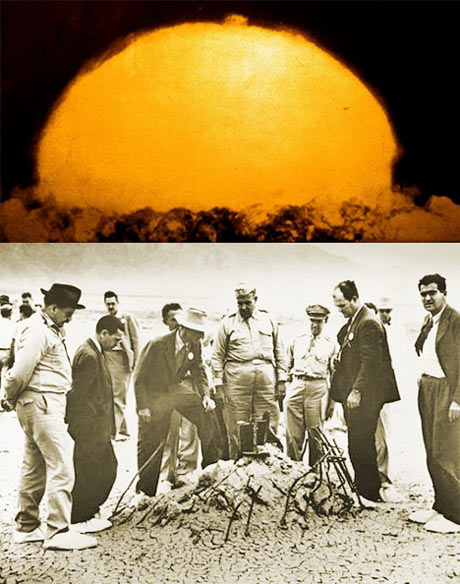ANNIVERSARY OF AMERICA’S INFAMY
(Photo credit Universal History Archive/UIG via Getty Images)

One of the troubling realities in the USA is the power in the hands of John Bolton, US National Security Advisor, a rabid pro-war advocate, known as hawkish since the presidency of Ronald Reagan, and for US policy reversals while serving the last Bush, such as the Anti-Ballistic Missile Treaty and the International Criminal Court, and now pushing for regime change in Venezuela, Iran, Syria and probably North Korea and elsewhere.
Bolton is a warmonger who might casually use nuclear weapons, if he had the chance. But he should ponder the outcomes. July 16th marked the 74th anniversary of the first nuclear explosion in the USA. The full range of adverse effects will probably never be known.
On July 16th 1945, the US Manhattan project, headed by J. Robert Oppenheimer, tested its product, an atomic bomb, at Trinity, New Mexico. (See pictures at right.) Oppenheimer described the sight as if “the radiance of a thousand suns were to burst at once into the sky,…” (recalling a line from the Bhagavad Gita, XI,12); and later, seeing its effects, “Now I am become Death, the destroyer of worlds.” (Gita XI,32).
Secretary of War Henry Stimson, who was in charge of the project, authorised the bombing of Hiroshima on August 6, and Nagasaki on August 9, killing 129,000–226,000 people, most of whom were civilians.
The Trinity flash was visible for up to 200 miles and the sound heard fifty miles away. While obliterating nearly all traces of the structure it had stood on, the bomb created a huge crater, and gave birth to a new environmental pollutant, radiation.
Reactions ranged from elation at the scientific achievement (“...the greatest thing in history.” – Harry S. Truman) to condemnation (“It was my belief that Japan was, at this very moment, seeking a way to surrender with a minimum loss of ‘face.’ It wasn’t necessary to hit them with that awful thing.” – General Dwight D. Eisenhower.)
Mr. Bolton and other hawks nurtured by Trump should re-read the book “Myths of August” written at the time by Stewart L. Udall US Congressman, who said, “And I have come to view the Hiroshima and Nagasaki bombings that August as an American tragedy that should be viewed as a moral atrocity.”
Senator Dale Bumpers, Arkansas, wrote, “[This] is a book about lies the kind of lies we tell ourselves to evade or obscure the truth of what we do or of who we are, the kind of lies we tell others to hide the same truths.”
It was high drama at Lord’s in London last Sunday as the ICC Cricket World Cup (CWC) Final between England and New Zealand scripted a chapter in cricketing history never before seen and would likely never again be enacted.
In their 50 overs encounter, the two rivals posted the exact total of 241 runs thus tying the scores and according to the ICC rules, the match would be resolved by playing a Super Over. But even that over failed to produce a conclusive winner as the scores of the two sides were again tied at 15 runs each when New Zealand’s Martin Guptill was run out off the final ball.
By virtue of another ICC rule, England were declared winners having scored the greater number of boundaries during the match, and crowned the 2019 World Cup champions for the first time ever.
England’s Jofra Archer bowled the Super Over against Martin Guptill and Jimmy Neesham, who smashed a six off the second ball. With two runs required off the final ball, wicketkeeper Jos Buttler and Jason Roy combined to run out Guptill as he came back for the second.
This has to go down as one of the best and most testing finals in the history of Cricket World Cups. Both teams played high attrition cricket on a pitch where run-making was not always easy.
After defeats in previous finals against Pakistan in 1992, Australia in 1987 and the West Indies in 1979, it was a cathartic moment for English cricket.
“My heart is still racing. It’s the biggest thing I’ve ever won, a great bunch of fellas, a really good family to me,” Archer said.
Ben Stokes was in tears as England’s players danced joyously around the pitch.


